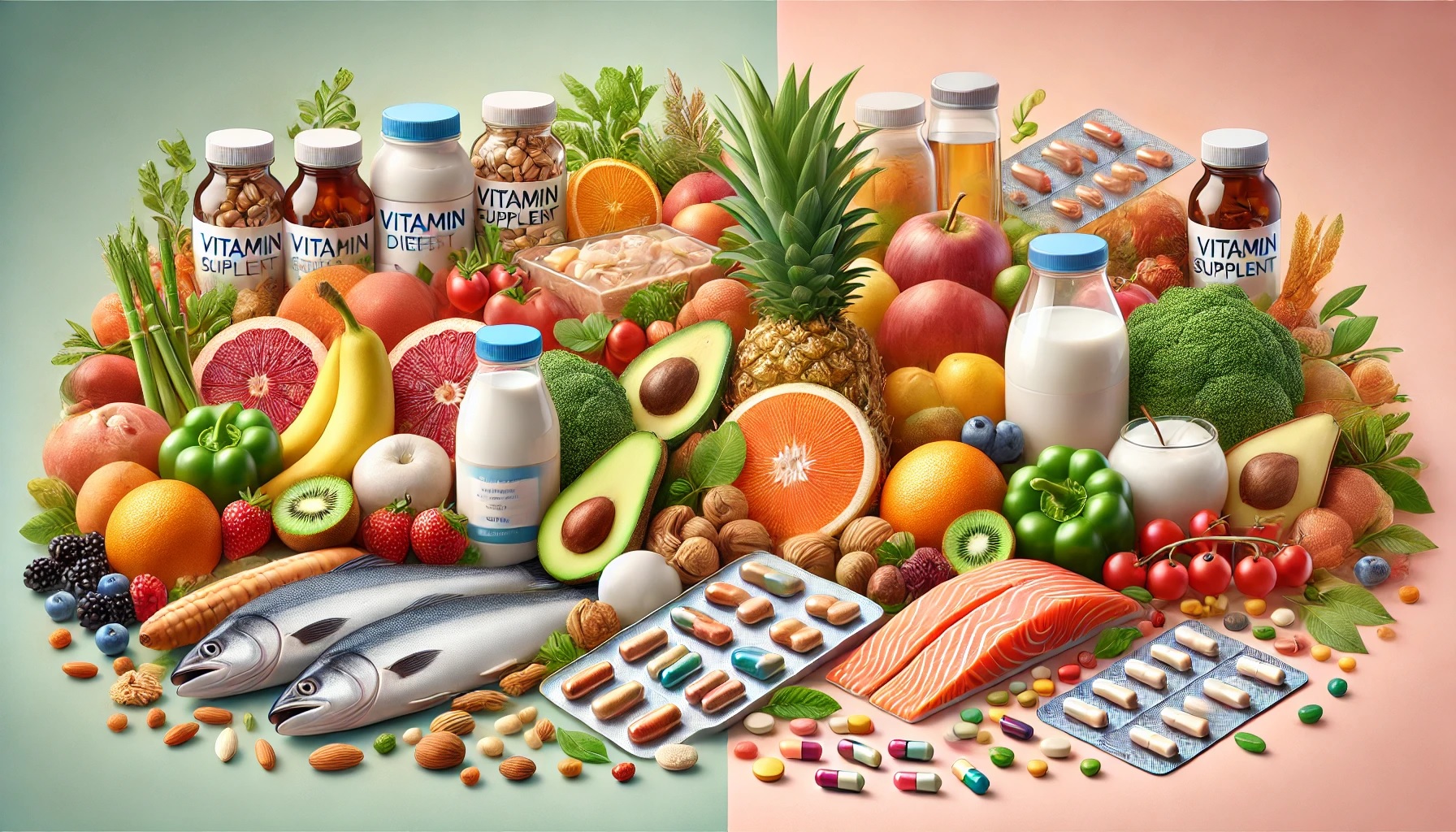Essential vitamins for health are crucial organic compounds that support metabolism, immunity, and overall well-being. Unlike macronutrients like carbohydrates, proteins, and fats, vitamins don’t provide energy directly, but they are crucial for metabolism and immunity. Since the body cannot produce most vitamins naturally, they must be obtained through a balanced diet or supplements. Let’s dive into the importance of vitamins, their types, and how they impact your health. Our health related website Clear Mind Haven gives you full information about essential vitamins for immunity.
What Are Vitamins and Why Are They Important?
Vitamins are micronutrients that support various bodily functions, from boosting immunity to promoting healthy skin and bones. They act as coenzymes, helping enzymes carry out essential chemical reactions in the body. Without adequate vitamins, you may experience fatigue, weakened immunity, and even chronic health issues.
Vitamins are classified into two main categories based on how they dissolve and are stored in the body: water-soluble and fat-soluble. Understanding this classification is key to optimizing your vitamin intake.
Water-Soluble Vitamins and Their Functions in the Human Body
Water-soluble vitamins are essential vitamins for health because they are not stored in the body and must be replenished daily through diet. Any excess is excreted through urine, so they need to be consumed regularly. These vitamins include Vitamin C and the B-complex group.
1. Vitamin C (Ascorbic Acid)
Functions: Boosts immunity, promotes collagen production for healthy skin, and acts as an antioxidant to protect cells from damage.
Sources: Citrus fruits (oranges, lemons), strawberries, bell peppers, and broccoli are also good sources.
2. B-Complex Vitamins
- Vitamin B1 (Thiamine) helps neuron function and transforms food into energy. present in nuts, beans, and whole grains.
- Vitamin B2 (Riboflavin) promotes energy production and healthy skin. Sources include dairy, eggs, and leafy greens.
- Vitamin B3 (Niacin) promotes healthy nerves, skin, and digestion. present in peanuts, seafood, and poultry.
- Vitamin B5 (Pantothenic Acid) contributes to hormone and cholesterol production. Present in avocados, mushrooms, and eggs.
- Vitamin B6 (pyridoxine) is essential for brain health and hemoglobin production. Found in bananas, chickpeas, and salmon.
- Vitamin B7 (Biotin) supports strong, healthy skin, hair, and nails. Sources include eggs, almonds, and sweet potatoes.
- Vitamin B9 (Folate/Folic acid) is crucial for DNA synthesis and fetal development. It is found in leafy greens, beans, and fortified cereals.
- Vitamin B12 (cobalamin) helps nerve function and red blood cell formation. Found in meat, fish, and dairy.
Fat-Soluble Vitamins and Their Functions for Overall Health
Fat-soluble vitamins are essential vitamins for health as they support immunity, improve vision, and strengthen bones. Unlike water-soluble vitamins, they do not need to be consumed daily but require dietary fats for absorption. The main fat-soluble vitamins include:
- Vitamin A: It promotes skin health, the immune system, and vision. It is found in foods like liver, carrots, and leafy greens.
- Vitamin D: It is essential for calcium absorption and bone health. It is synthesized by the skin through sunlight exposure and found in dairy products and fatty fish.
- Vitamin E: It acts as an antioxidant, preventing cell damage. It is present in nuts, seeds, and vegetable oils.
- Vitamin K: It is required for blood clotting and bone metabolism. Found in leafy greens and fermented foods.
Effects of Essential Vitamins for Health and Their Deficiency on Mental Health
Vitamin deficiencies do not just impact physical health but also play a significant role in mental well-being. A lack of essential vitamins can lead to mood swings, anxiety, and even depression. Here are some key vitamins that influence mental health:

- Vitamin B12 Deficiency: It causes depression, memory problems, and brain fog. This vitamin is crucial for nerve function and neurotransmitter production.
- Vitamin D Deficiency: It is linked to Seasonal Affective Disorder (SAD) and depression. Low levels can reduce serotonin production, which regulates mood.
- Vitamin B6 Deficiency: It leads to irritability, depression, and cognitive decline because it helps produce neurotransmitters like dopamine and serotonin.
- Folate (Vitamin B9) Deficiency: It is essential for brain function, and low levels can cause depression and fatigue.
- Vitamin C Deficiency: It results in fatigue, irritability, and poor concentration, negatively affecting mental well-being.
A diet rich in these vitamins helps maintain a balanced mood, boosts cognitive function, and lowers the risk of mental health disorders.
Signs and Symptoms of Vitamin Deficiencies
A lack of essential vitamins for health can result in serious deficiencies, impacting immunity, energy levels, and mental well-being. Here are some common signs and symptoms of deficiencies for key vitamins:
- Vitamin A Deficiency: Night blindness, dry skin, and a weakened immune system.
- Vitamin B1 (Thiamine) Deficiency: Fatigue, nerve damage, and muscle weakness (common in Beriberi disease).
- Vitamin B12 Deficiency: Anemia, fatigue, memory problems, and nerve damage.
- Vitamin C Deficiency: Weak immune function, bleeding gums, slow wound healing (leading to scurvy).
- Vitamin D Deficiency: Weak bones, muscle weakness, and increased risk of osteoporosis.
- Vitamin E Deficiency: Muscle weakness, vision problems, and a weakened immune system.
- Vitamin K Deficiency: Excessive bleeding and easy bruising due to impaired blood clotting.
Ensuring an adequate intake of these vitamins through a balanced diet is essential to avoid these health issues.
Why a Balanced Diet Rich in Natural Vitamin Sources Is Better Than Supplements?

Vitamin supplements are easily available, but obtaining vitamins from natural food sources is more beneficial. Whole foods provide a balanced combination of nutrients, fiber, and bioactive compounds that work together to improve health. Excessive use of vitamin supplements can sometimes lead to toxicity, especially fat-soluble vitamins that accumulate in the body. For instance:
- Excessive vitamin A can cause liver damage and birth defects.
- High doses of vitamin D may result in calcium buildup in the blood, leading to kidney issues.
- Overconsumption of vitamin E supplements has been linked to an increased risk of bleeding disorders.
A diet rich in fruits, vegetables, whole grains, lean proteins, and healthy fats provides the best natural sources of vitamins. Prioritizing a varied and nutrient-dense diet ensures optimal vitamin intake without the risks associated with excessive supplementation.
The Importance of Essential Vitamins for Health and Well-Being
Vitamins are essential for keeping your body strong, healthy, and functioning properly. They help your immune system fight diseases, keep your bones and skin healthy, and ensure that your body has enough energy to carry out daily activities. Understanding the difference between water-soluble and fat-soluble vitamins can help you make better food choices. Instead of relying on supplements, try to get your vitamins from a balanced diet rich in fresh fruits, vegetables, dairy, nuts, and whole grains. A well-balanced diet rich in essential vitamins for health ensures you stay active, energized, and free from deficiencies. Making smart dietary choices today will lead to a healthier and happier life in the long run.
Want to Read More?
- Read more about [The Best Vitamins for Kids and Teens Do they Need Supplements?]
- Stay connected with us, Click here


3 Comments
Pingback: The Best Vitamins for Kids and Teens Do they Need Supplements? - clearmindhaven.com
Pingback: Water-Soluble Vitamins list and functions to stay healthy & Fit - clearmindhaven.com
Pingback: What Are Fat-Soluble Vitamins: A Complete Guide - clearmindhaven.com